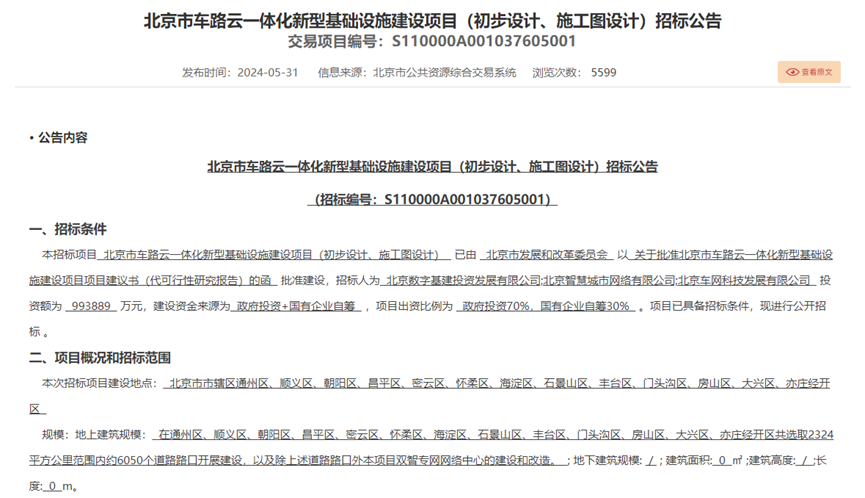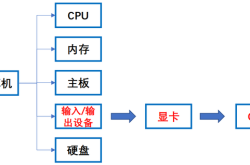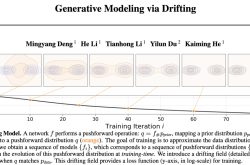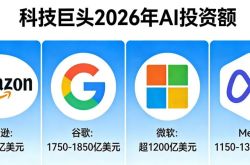“Vehicle-Road-Cloud Integration” Ushers in a New Era, Which Cities and Enterprises Will Take the Lead in Triggering the Intelligent Connected Revolution?
![]() 11/26 2024
11/26 2024
![]() 679
679
Introduction: An announcement from the Beijing Public Resources Trading Service Platform has officially sounded the clarion call for the comprehensive upgrading of the intelligent connected vehicle industry - the public tender for the "Beijing Vehicle-Road-Cloud Integration New Infrastructure Construction Project" not only signifies the transition from blueprint to concrete construction in the Vehicle-Road-Cloud Integration technology roadmap but also symbolizes the determination to invest heavily in the infrastructure construction, with an investment scale exceeding RMB 10 billion. This initiative, like a powerful east wind, has injected a shot in the arm for both insiders and outsiders of the industry, making the advancement of Vehicle-Road-Cloud Integration imperative, and the future transformation towards intelligent transportation is just around the corner.

The announcement clearly states that government and state-owned enterprise funds will jointly invest, with the government investment accounting for a strong guarantee of up to 70%. This undoubtedly lays a solid foundation for the smooth implementation of the project. This is not only a positive response to the guidance of central policies - following the support document jointly issued by the Ministry of Transport and the Ministry of Finance - but also a significant upgrade to the construction of high-level autonomous driving demonstration zones. The construction scale of its phase 4.0 is nearly four times that of phase 3.0, demonstrating Beijing's and the nation's far-reaching layout and firm determination to build the future transportation system. The specific subdivisions of the tender project, such as the rapid follow-up of the "Dual-Smart Dedicated Network Construction Project" and "Roadside Intelligent Sensing Equipment," indicate that the infrastructure construction of Vehicle-Road-Cloud Integration is in full swing. Among them,
Information technology investment
accounts for up to 60%, highlighting the core value of advanced technology and data integration capabilities in building an intelligent transportation network. Behind these actions lies not only the transformation and upgrading of physical infrastructure but also a profound change centered around intelligent transportation solutions, bringing unprecedented development opportunities to related enterprises and the entire industrial chain. Multiple enterprises in the field of intelligent transportation and vehicle-road coordination have been brought into the spotlight, indicating that a new wave of technological innovation and market expansion is imminent.
Policy Guidance, the General Trend
On January 15, 2024, the Ministry of Industry and Information Technology, Ministry of Public Security, Ministry of Natural Resources, Ministry of Housing and Urban-Rural Development, and Ministry of Transport issued a notice on carrying out pilot applications of intelligent connected vehicles' "Vehicle-Road-Cloud Integration" with a pilot period from 2024 to 2026. According to the report "In the Era of Data-Driven Development, 'Vehicle-Road-Cloud Integration' Accelerates the Commercialization of Autonomous Driving" by CCID Consulting, the market size of intelligent connected vehicles in China was nearly RMB 600 billion in 2022 and is expected to exceed RMB 5 trillion by 2030, with a related market size of over RMB 14 trillion for "Vehicle-Road-Cloud Integration." The market scale is enormous. In the "Notice on Carrying Out Pilot Applications of Intelligent Connected Vehicles' 'Vehicle-Road-Cloud Integration,'" I believe there are three key points worth noting:
1. Constructing intelligent roadside infrastructure. This is another historic innovation in China's intelligent connected vehicle industry, marking the country's accelerated construction of a supporting system for the development of intelligent connected vehicles. Through the widespread application of various advanced technologies and the highly intelligent and networked transformation of roadside facilities, an efficient operating environment for vehicle-road coordination has been achieved, promoting the upgrading of the intelligent transportation industry and laying an important foundation for the construction of digital cities and the transformation of future travel modes.
2. Carrying out large-scale demonstration applications. This means that China's "Vehicle-Road-Cloud Integration" is gradually realizing leapfrog development in the industrialization of the "Chinese solution" for intelligent connected vehicles, marking a milestone transition from small-scale verification to large-scale application. By deploying large-scale demonstration projects in diverse scenarios, a comprehensive intelligent transportation operation system will be explored and established, promoting innovation in commercial models and verifying the efficiency and safety of intelligent connected vehicles in actual operations, laying a solid foundation for the construction of China's intelligent transportation system and the comprehensive promotion of smart cities.
3. Exploring new models and new formats. This has strategic significance for innovation and commercialization exploration in the intelligent connected vehicle industry. By clarifying the main commercial operation entities of "Vehicle-Road-Cloud Integration" and exploring diversified investment and construction models, market vitality can be stimulated, promoting the nurturing and development of new business models. At the same time, while ensuring data security, it promotes the circulation and cross-regional sharing of data elements, aiming to build an efficient, safe, and sustainable intelligent transportation business ecosystem. The large-scale demonstration applications proposed in the notice cover multiple key scenarios, effectively promoting the transformation and upgrading of the intelligent connected vehicle industry towards a "new industry." It not only achieves breakthroughs and applications in key technologies but also conducts in-depth exploration and innovation in business models, effectively activating new momentum for the coordinated development of upstream and downstream of the industrial chain. The vigorous promotion of the Beijing Vehicle-Road-Cloud Integration project is not only another vivid practice of Beijing as a technological innovation center but also a powerful testament to the leapfrog development of China's intelligent connected vehicle industry. With the gradual implementation of the project, Vehicle-Road-Cloud Integration will start from Beijing, radiate across the country, and lead China and even the global intelligent transportation system into a new era. This is not only an iterative upgrade of technology but also a reconstruction and vision for future travel modes, heralding the accelerated arrival of a more intelligent, safe, and efficient transportation era.
Which Pilot Cities Will Lead the Future of Intelligent Transportation?
Experts have stated that the first batch of cities applying for the Vehicle-Road-Cloud Integration pilot program totals 32 to 33, with Beijing's overall investment being the largest, estimated at RMB 13 billion, of which the public bidding amount related to roadside infrastructure exceeds RMB 9 billion. It is expected that 18 to 22 cities will be selected as Vehicle-Road-Cloud Integration demonstration units. The country plans to promote related investments within the next 1 to 2 years, with a total amount potentially reaching RMB 100 billion. I believe that, assuming Beijing's tender amount is nearly RMB 10 billion and 20 cities are selected for the first batch, the maximum total amount could reach RMB 200 billion. However, considering that investment amounts in cities other than Beijing, Shanghai, Guangzhou, and Shenzhen are slightly less, the total amount will be between RMB 100 billion and RMB 150 billion. Here is a bold prediction of which cities, other than Beijing, could be selected for the first batch of pilots:
Shanghai
The automotive industry is Shanghai's largest indigenous manufacturing sector. In 2023, Shanghai's local vehicle production reached 2.156 million units, of which 1.28 million were new energy vehicles, marking a year-on-year increase of 35% and accounting for 13.4% of the national total. The "Shanghai Plan for Accelerating the Innovative Development of Intelligent Connected Vehicles" mentions that by 2025, the city will initially establish a domestically leading innovative development system for intelligent connected vehicles. The industrial scale is expected to reach RMB 500 billion, with vehicles equipped with combined driving assistance functions (Level 2) and conditionally automated driving functions (Level 3) accounting for over 70% of new vehicle production, and vehicles with highly automated driving functions (Level 4 and above) achieving commercial application in restricted areas and specific scenarios. At the 2024 Shanghai Global Investment Promotion Conference's Intelligent Connected Vehicle Industry Chain Investment Promotion Meeting, 17 new intelligent connected vehicle projects, including ZF Asia Pacific and MoGu Auto, successfully signed contracts with a total investment of RMB 3.24 billion. Jiading District in Shanghai has now fully opened its intelligent connected vehicle testing roads, with a total open testing road mileage of 1,117 kilometers and approximately 9,100 testable scenarios. Currently, Shanghai is constructing an innovative ecosystem and industrial ecosystem for the intelligent connected vehicle industry, advancing comprehensive demonstration construction of "Vehicle-Road-Cloud Integration." The Shanghai International Automobile City in Jiading District has deployed a cloud-controlled testing and validation environment with over 70 kilometers of V2X, integrated perception, and high-precision map coverage.
Shenzhen
Shenzhen announced its "20+8" industrial cluster strategic layout on June 6, 2022, with intelligent connected vehicles listed as one of the strategically emerging industries with significant progress. Currently, Shenzhen's intelligent connected vehicles are in a rapid development phase. As of August 2023, the Shenzhen Municipal Transportation Bureau had issued a total of 224 trial licenses for intelligent connected vehicles within the Shenzhen region, with plans to issue up to 1,000 by 2025. The "Shenzhen Action Plan for Cultivating and Developing the Intelligent Connected Vehicle Industry Cluster (2022-2025)" mentions that by 2025, significant breakthroughs will be made in key technological fields of intelligent connected vehicles, with a noticeable enhancement in industrial basic research and development capabilities. A group of key enterprises in the intelligent component supply chain will be cultivated, achieving early leadership in network connectivity, substantial leaps in intelligence, and comprehensive penetration of electrification. The operating revenue of the intelligent connected vehicle industry will reach RMB 200 billion, forming a strategic echelon of over 10 enterprises with revenue exceeding RMB 10 billion and over 20 enterprises with revenue exceeding RMB 1 billion.
Hangzhou
As one of the first batch of pilot cities for new energy vehicle demonstration and promotion in China, a national 5G Internet of Vehicles application demonstration area, a national high-precision map application pilot city, and one of the first batch of "Gigabit Cities" in China, Hangzhou has witnessed rapid development in the intelligent connected vehicle industry in recent years, with an industrial scale exceeding RMB 200 billion. Management measures and local legislation have been successively introduced, and the country's first core urban area super high-speed rail hub travel route has been created, making Hangzhou the first city in China to open intelligent connected vehicle travel services at a 40 million-level international airport. Next, Hangzhou will strive to create a benchmark city for national intelligent connected vehicles' "Vehicle-Road-Cloud Integration."
Shenyang
As one of the country's important automobile production bases, Shenyang has successfully entered the new race of intelligent connected vehicles, with its development advantages emerging and accelerating. "The automotive industry and the new-generation information technology industry are key industrial clusters developed by the city, serving as important supports for promoting high-quality development," said a relevant responsible person from the Shenyang Municipal Industry and Information Technology Bureau. "After more than two years of exploration, significant progress has been made in the Shenyang practice of the 'Vehicle-Road-Cloud Integration' Chinese solution, with continuous achievements." In terms of facility integration, Shenyang has designated the entire 101 square kilometers of Dadong District as a pilot area, forming a "6+2" smart road network construction pattern, with 44 kilometers of Level 2 smart bus roads and 35 kilometers of Level 4 autonomous driving test roads put into use. In terms of data integration, six basic platform components of "Vehicle-Road-Cloud Network Map + Security" have been constructed, with commercial area intelligent connected vehicle and autonomous vehicle data accessed to the cloud control platform. The AI computing center provides services to enterprises, enabling data interoperability and providing strong support for intelligent network technology innovation and large-scale application. In terms of application integration, the intelligent connected vehicle industry eco-park has gathered 26 enterprises such as Cloud Control Intelligence, Nebula Link, and MoGu Auto, launching demonstration scenarios in the commercial area such as driverless minibus shuttles, driverless passenger cars, smart buses, and unmanned vending.
Changsha
The intelligent connected vehicle industry is a strategically emerging industry that Hunan Province and Changsha City focus on cultivating and developing. In recent years, Changsha's intelligent connected vehicle industry has flourished, with continuous improvement in urban infrastructure and testing and demonstration policies for intelligent connected vehicles, forming a group of nationally leading intelligent connected application scenarios and creating the city image of "Changsha, the City of Autonomous Driving." As the only city holding four national licenses (National Intelligent Connected Vehicle (Changsha) Test Zone, National Internet of Vehicles Pilot Zone, National Intelligent Connected Vehicle Quality Supervision and Inspection Center (Hunan), and National Pilot City for the Coordinated Development of Smart City Infrastructure and Intelligent Connected Vehicles), Changsha is building an intelligent connected vehicle industry cluster.
Leading Enterprises Conjecture, a New Race in the Technological Field
In the emerging blue ocean of Vehicle-Road-Cloud Integration, major technology giants are gearing up to showcase their prowess in this cross-border competition that integrates automobiles, communications, and cloud computing. Below are several enterprises closely related to Vehicle-Road-Cloud Integration:
1. Tencent
Supported by cloud computing and big data, Tencent's intelligent mobility solutions cover multiple fields such as intelligent connectivity, autonomous driving, and vehicle-road coordination. Its powerful data processing capabilities and user service experience will help the Vehicle-Road-Cloud Integration platform achieve efficient data integration and service optimization, enhancing user experience.
2. Baidu
Leveraging its deep accumulation in the field of autonomous driving and the Apollo Intelligent Transportation Solution, Baidu Apollo can provide comprehensive technical support from autonomous vehicles to cloud scheduling within the Vehicle-Road-Cloud Integration framework. Baidu's leading advantages in high-precision maps and AI algorithms will accelerate the mature application of intelligent transportation systems.
3. Huawei
Huawei's global leadership in ICT infrastructure, cloud computing, and 5G technology provides a solid foundation for its participation in Vehicle-Road-Cloud Integration construction. Huawei's C-V2X solution can effectively link vehicles, roads, and cloud platforms, enabling high-speed data transmission and intelligent analysis, providing powerful momentum for intelligent transportation systems.
4. MoGu Auto
As an innovative enterprise dedicated to creating a full-stack technology and operation service provider for "Vehicle-Road-Cloud Integration" autonomous driving, MoGu Auto has independently developed the industry's first "Vehicle-Road-Cloud Integration" autonomous driving system, mastering full-stack technology for Level 4 autonomous driving. With core software and hardware independently developed, it has formed a complete standardized autonomous driving product package, including AI digital road base stations, autonomous vehicles, and intelligent transportation AI cloud platforms, which can be rapidly and massively deployed in urban open roads, highways, and other scenarios, potentially bringing new application demonstrations to Vehicle-Road-Cloud Integration projects.
5. China Unicom
As one of the country's major telecommunications operators, China Unicom's advantages in 5G network deployment, the Internet of Things, big data, etc., will provide stable and efficient communication support for Vehicle-Road-Cloud Integration projects. Unicom's cloud-network integrated solution can provide reliable support for real-time data transmission and processing in intelligent transportation.
6. NavInfo
As a leading domestic provider of digital map content, the Internet of Vehicles, and dynamic transportation information services, NavInfo's deep accumulation in high-precision maps and location services will directly serve the needs of precise vehicle positioning and route planning in vehicle-road coordination, providing solid foundational geographic information service support for Vehicle-Road-Cloud Integration.
7. Wanji Technology
With years of deep cultivation in intelligent transportation systems, Wanji Technology has leading technology in ETC products and solutions, intelligent transportation big data services, and other fields. Under the Vehicle-Road-Cloud Integration framework, its intelligent transportation facilities (such as RSU roadside units) and big data processing capabilities will be key elements in achieving efficient interaction between vehicles and roads.
8. Qianfang Technology
With years of deep cultivation in the field of intelligent transportation, Qianfang Technology has rich experience and technological accumulation in smart parking, traffic management, electronic toll collection, etc. Its intelligent transportation system solution, combined with vehicle-road coordination technology, will effectively improve traffic management efficiency and service quality, promoting the construction of Beijing's intelligent transportation ecosystem.
9. Jinyi Technology
Focusing on the research and development of ETC products and intelligent transportation information systems, Jinyi Technology possesses core technologies in vehicle-road coordination communication technology and traffic information collection. Its products and services will play an important role in improving the operational efficiency of transportation systems and realizing intelligent vehicle identification and management. Conclusion: As the cornerstone of future intelligent transportation, the pilot construction of Vehicle-Road-Cloud Integration not only requires the support of cutting-edge technology from technology enterprises but also relies on the foresight and policy guidance of local governments. With the upcoming announcement of the first batch of pilot cities and the entry of more enterprises, "Vehicle-Road-Cloud Integration" will move from vision to reality, opening a new chapter in the era of intelligent connected vehicles.

All rights reserved. Infringement will be prosecuted. Reproduction is prohibited without authorization








